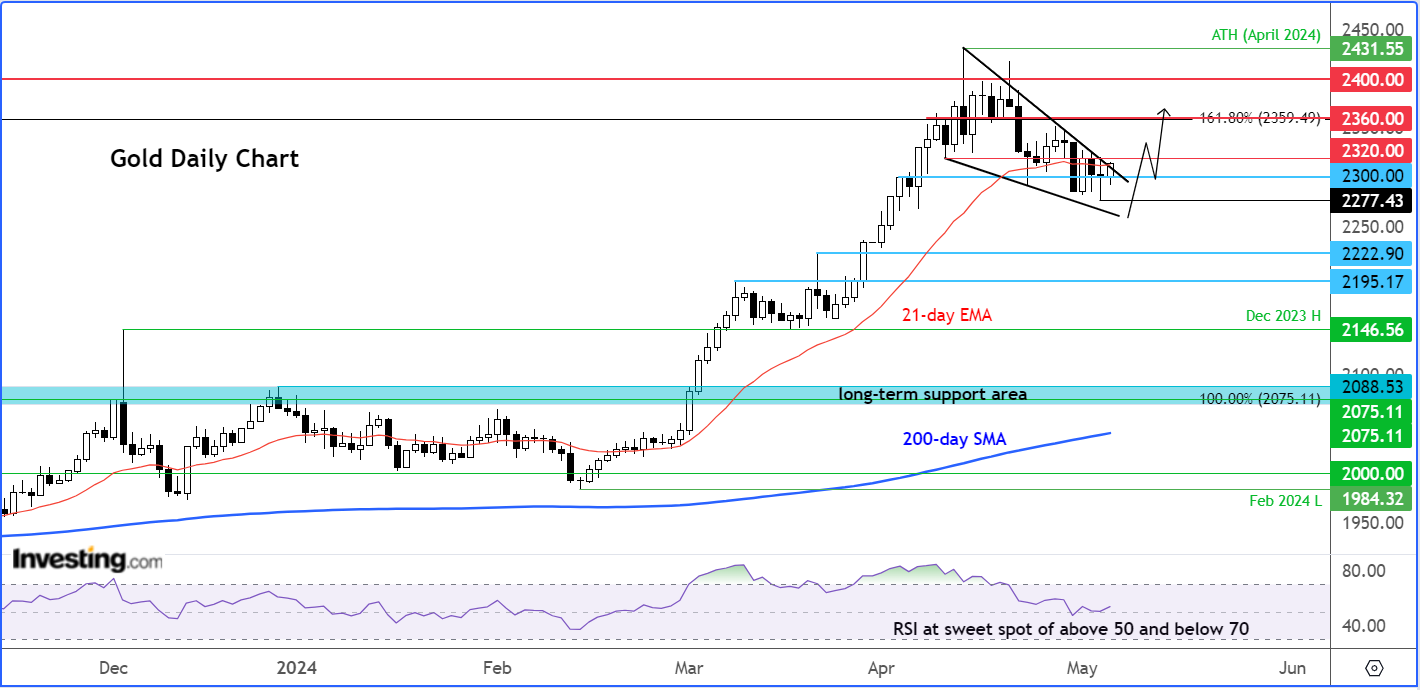- Gold and silver rebound as weak US data sparks hope for Fed rate cuts in 2024.
- Inflation remains a concern, but a potential economic slowdown could push the Fed to ease policy faster.
- Gold's long-term outlook remains bullish, with potential for further gains despite a quiet data week ahead.
- Invest like the big funds for under $9/month with our AI-powered ProPicks stock selection tool. Learn more here>>
Gold and silver were both trading higher as the new week got underway.
The two metals had bounced off their lows after Friday’s key US macro data – the April non-farm payrolls report and the ISM services PMI – both disappointed expectations. Also, there was more evidence that the fight against inflation will continue for a while with the ISM’s services PMI prices paid index showing a sizable jump.
Against this backdrop, investors are becoming a bit hopeful again that the Fed could cut rates at least a couple of times before the end of 2024, after all. But for the market to sharply reprice US interest rates lower again, more evidence of an economic slowdown is needed.
Unfortunately, there won’t be much data to look forward to in the week ahead, until the UoM’s surveys on Friday, although this may not be a bad thing for gold. But regardless of any short-term volatility we may see in gold prices this week, there is no question about gold’s longer-term outlook.
Why has gold been rising this year?
Gold has been buoyed by years of persistent inflation eroding the worth of fiat currencies, though it has recently weakened amid profit-taking and pushback against early rate cuts by the Fed. However, many investors, having missed the recent surge in gold and silver prices, are now eyeing price dips for potential buying opportunities.
Advocates of precious metals highlight their recent resilience despite a strong dollar and increasing bond yields. They argue that with prices no longer excessively high, the upward trend could resume, especially considering factors such as ongoing central bank gold acquisitions and the role of precious metals as hedges against inflation.
As mentioned, fiat currencies have substantially depreciated. This is a trend likely to continue due to persistent inflation in many countries. Therefore, demand for precious metals as a reliable hedge against inflation is expected to remain strong. This argues against a sharp sell-off.
Fed may cut rates in 2024 after all
Recent strong inflation numbers have dampened expectations for rate cuts in 2024. However, while hard data has been positive until Friday’s jobs report, softer survey-based figures have been soft. Adding to concerns about economic fragility was the latest ISM services PMI data that was released on Friday, which fell to 49.4 compared to an expected 52.0.
This unexpected decline followed a similar trend seen earlier in the week with the weaker-than-anticipated ISM manufacturing PMI and the dismal Chicago PMI. However, inflation continues to be an issue, and this was again highlighted by a sharp rise in the prices paid sub-index of the PMI, reaching 59.2 compared to 53.4 in the previous month. This pattern was also observed in input prices within the manufacturing sector PMI, which surged at the quickest rate since 2022, heightening worries about inflation. Earlier last week we also saw a larger-than-anticipated increase in the employment cost index.
The ISM manufacturing PMI itself indicated a contraction in US factory activity, returning to contraction territory after only one month of expansion since September 2022. The ISM services PMI also fell back into contraction, while Friday’s employment report signaled the labor market is softening. These soft data releases come after the JOLTs job openings reached their lowest point in over three years. Additionally, the quits rate dropped to its lowest level since August 2020, indicating a potential slowdown in wage growth in the upcoming months.
Thus, the combination of elevated inflation and weakening leading economic indicators suggests a more pronounced economic slowdown may be on the horizon, potentially necessitating a quicker pace of policy easing in the future. Consequently, while the Fed might postpone the initiation of rate cuts due to persistent inflationary pressures, once the cutting cycle commences, it could unfold rapidly.
This scenario argues against a sustained strengthening of the US dollar against currencies where economic recovery is emerging, such as the euro. Gold, meanwhile, is likely to remain supported as it is deemed to be an effective inflation hedge and will benefit from any dovish repricing of US interest rates again.
What to watch out for in the week ahead?
It's a relatively quiet week for US data, especially after the recent Fed policy decision, NFP, and other economic indicators. However, ongoing concerns about persistent inflationary pressures that have been reflected in various economic indicators remain. Those concerns could intensify if the University of Michigan’s Inflation Expectations survey shows a further increase, come Friday 10 May.
Inflation expectations have been climbing steadily in recent months from 2.9% in January to 3.2% in April. This is the percentage that surveyed consumers (about 500) expect the price of goods and services to change during the next 12 months, which is a leading indicator of inflation. It will need to weaken to help fuel a drop in the US dollar. But gold, which has shown resilience in the face of sticky inflation data, could benefit from a stronger print, even if that would be dollar positive.
Gold technical analysis and trade ideas
Although there's potential for the correction to continue on gold, I believe the risks still lean towards upward movement. The metal has been confined within a descending wedge pattern in recent weeks, following its earlier record-breaking breakout. This consolidation phase has allowed momentum indicators like the RSI to reset from their "overbought" levels through both time and price.

Bulls now await a breakout above the wedge pattern's resistance trend to signal a continuation of the uptrend. This comes in around $2320-$2330 area. This potential breakout could happen as early as this week. If so, watch out for an initial rise towards $2360 ahead of the next upside target at $2400. The record high that was hit earlier in April comes in at $2431. But the potential rally could easily extend far beyond that level once the ball gets rolling.
However, if bearish price action persists instead, then we could see a lengthier face of consolidation. While the metal remains below the bearish trend of its falling wedge pattern, I wouldn’t rule out a drop to the next support level, around the $2222 to $2195 range. But this is not by base case scenario as I am expecting to see a bullish breakout this week, instead.
***
Be sure to check out InvestingPro to stay in sync with the market trend and what it means for your trading. As with any investment, it's crucial to research extensively before making any decisions.
InvestingPro empowers investors to make informed decisions by providing a comprehensive analysis of undervalued stocks with the potential for significant upside in the market.
Subscribe here for under $9/month and never miss a bull market again!

Don't forget your free gift! Use coupon codes OAPRO1 and OAPRO2 at checkout to claim an extra 10% off on the Pro yearly and bi-yearly plans.
Disclaimer: This article is written for informational purposes only; it does not constitute a solicitation, offer, advice, or recommendation to invest as such it is not intended to incentivize the purchase of assets in any way. I would like to remind you that any type of asset, is evaluated from multiple points of view and is highly risky and therefore, any investment decision and the associated risk remains with the investor.
